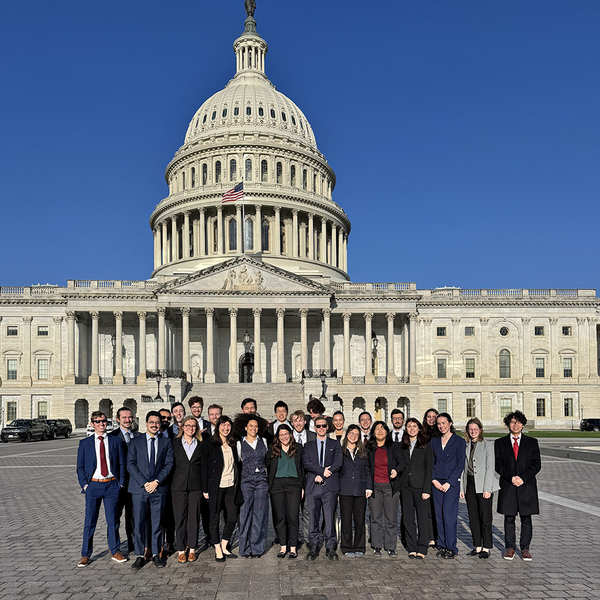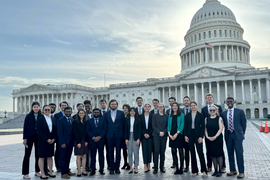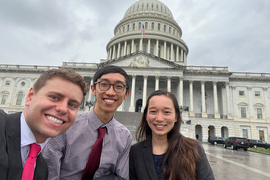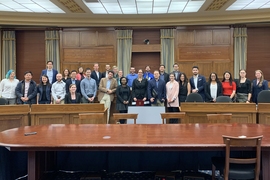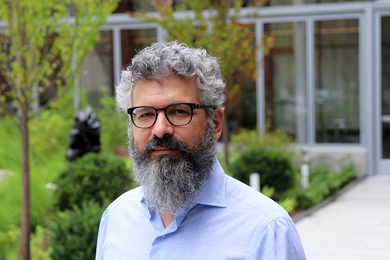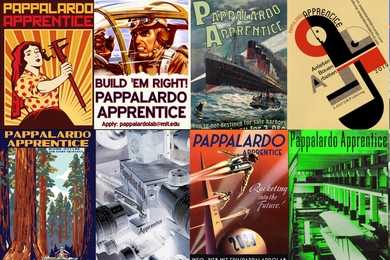This spring, 25 MIT students and a postdoc traveled to Washington, where they met with congressional offices to advocate for federal science funding and specific, science-based policies based on insights from their research on pressing issues — including artificial intelligence, health, climate and ocean science, energy, and industrial decarbonization. Organized annually by the Science Policy Initiative (SPI), this year’s trip came at a particularly critical moment, as science agencies are facing unprecedented funding cuts.
Over the course of two days, the group met with 66 congressional offices across 35 states and select committees, advocating for stable funding for science agencies such as the Department of Energy, the National Oceanic and Atmospheric Administration, the National Science Foundation, NASA, and the Department of Defense.
Congressional Visit Days (CVD), organized by SPI, offer students and researchers a hands-on introduction to federal policymaking. In addition to meetings on Capitol Hill, participants connected with MIT alumni in government and explored potential career paths in science policy.
This year’s trip was co-organized by Mallory Kastner, a PhD student in biological oceanography at MIT and Woods Hole Oceanographic Institution (WHOI), and Julian Ufert, a PhD student in chemical engineering at MIT. Ahead of the trip, participants attended training sessions hosted by SPI, the MIT Washington Office, and the MIT Policy Lab. These sessions covered effective ways to translate scientific findings into policy, strategies for a successful advocacy meeting, and hands-on demos of a congressional meeting.
Participants then contacted their representatives’ offices in advance and tailored their talking points to each office’s committees and priorities. This structure gave participants direct experience initiating policy conversations with those actively working on issues they cared about.
Audrey Parker, a PhD student in civil and environmental engineering studying methane abatement, emphasizes the value of connecting scientific research with priorities in Congress: “Through CVD, I had the opportunity to contribute to conversations on science-backed solutions and advocate for the role of research in shaping policies that address national priorities — including energy, sustainability, and climate change.”
To many of the participants, stepping into the shoes of a policy advisor was a welcome diversion from their academic duties and scientific routine. For Alex Fan, an undergraduate majoring in electrical engineering and computer science, the trip was enlightening: “It showed me that student voices really do matter in shaping science policy. Meeting with lawmakers, especially my own representative, Congresswoman Bonamici, made the experience personal and inspiring. It has made me seriously consider a future at the intersection of research and policy.”
“I was truly impressed by the curiosity and dedication of our participants, as well as the preparation they brought to each meeting,” says Ufert. “It was inspiring to watch them grow into confident advocates, leveraging their experience as students and their expertise as researchers to advise on policy needs.”
Kastner adds: “It was eye-opening to see the disconnect between scientists and policymakers. A lot of knowledge we generate as scientists rarely makes it onto the desk of congressional staff, and even more rarely onto the congressperson’s. CVD was an incredibly empowering experience for me as a scientist — not only am I more motivated to broaden my scientific outreach to legislators, but I now also have the skills to do so.”
Funding is the bedrock that allows scientists to carry out research and make discoveries. In the United States, federal funding for science has enabled major technological breakthroughs and advancements in manufacturing and other industrial sectors, and led to important environmental protection standards. While participants found the degree of support for science funding variable among offices from across the political spectrum, they were reassured by the fact that many offices on both sides of the aisle still recognized the significance of science.
